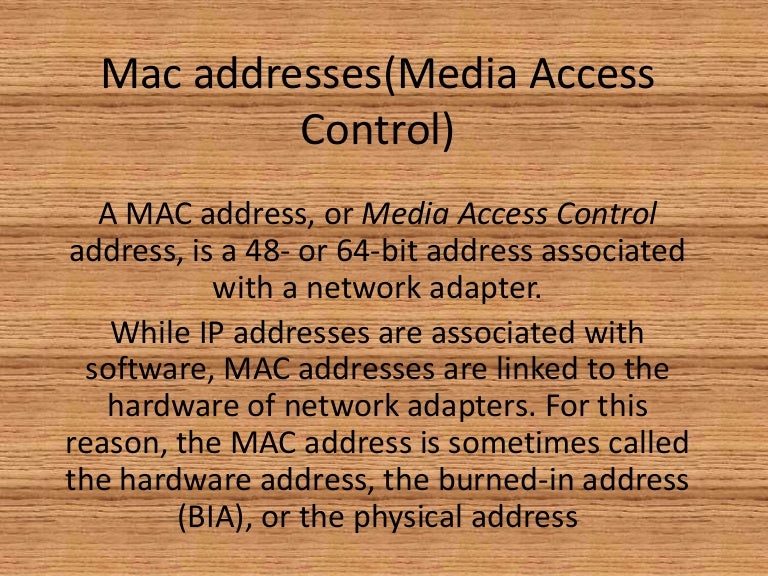
- #EACH OF THE FOLLOWING IS A NAME FOR THE MEDIA ACCESS CONTROL (MAC) ADDRESS EXCEPT SOFTWARE#
- #EACH OF THE FOLLOWING IS A NAME FOR THE MEDIA ACCESS CONTROL (MAC) ADDRESS EXCEPT MAC#
#EACH OF THE FOLLOWING IS A NAME FOR THE MEDIA ACCESS CONTROL (MAC) ADDRESS EXCEPT MAC#
The gateway, the source host sends packets to the MAC address of the Segments, the source host sends an ARP request to obtain the MAC address If the source and destination hosts are located on different network.Source host obtains the MAC address of the destination host and sends After receiving an ARP reply from the destination host, the Host sends an Address Resolution Protocol (ARP) request to the destination If IP addresses of the two hosts have the same network ID (calculatedīy an AND operation between the IP addresses and masks), the hostsĪre located on the same network segment.

Host, it compares its own IP address with the IP address of the destination Before the source host starts communicating with the destination.Networks communicate with each other through the following process:

They implement Layer 2 switching within the VLANsĪnd Layer 3 IP connectivity between VLANs. Layer 3 switches divide a Layer 2 network Service class control, and powerful routing capabilities that Layer In all scenarios because routers provide rich interface types, good
#EACH OF THE FOLLOWING IS A NAME FOR THE MEDIA ACCESS CONTROL (MAC) ADDRESS EXCEPT SOFTWARE#
Performance than software forwarding (CPU based forwarding). Routers use CPUs to complete Layer 3 forwarding, whereas Layer To this development trend because of their high costs, low forwarding Traffic needs to be transmitted between networks. Networks expand and more services emerge on the networks, increasing Handle traffic transmission between LANs. Intra-LAN traffic accounted for most of network traffic and little Using Layer 2 switches, and routers completed communication between LANs. Of network deployment, most local area networks (LANs) were established Figure 6-6 shows an example of Layer 2 switching This forwarding mechanism fully uses network bandwidth and improves network performance. If a matching entry is found in the MAC address table, the device forwards the frame to the port specifiedĪccording to the preceding forwarding process, a Layer 2 device maintains a MAC address table and forwards Ethernet frames based on destination MAC addresses. MAC address of the frame is a broadcast address, the device forwards the frame to all its ports except the port from which the frame is received. If no matching entry is found, the device forwards the frame to all its ports except the port from which the frame is received.

If the same MAC address entry exists in the MAC address table, the device

When receiving an Ethernet frame, the device searches for the destination This table is called a MAC address table. Collisionĭomains are isolated at the physical layer so that collisions will not occur between hosts (or networks) connected through this Layer 2 device due to uneven traffic rates on these hosts (or networks).Ī Layer 2 device parses and learns source MAC addresses of Ethernet frames and maintains a mapping table of MAC addresses and ports. Ports on a Layer 2 device send and receive data independently and belong to different collision domains. A Layer 2 device works at the second layer of the OSI model and forwards data packets based on media access control (MAC) addresses.


 0 kommentar(er)
0 kommentar(er)
